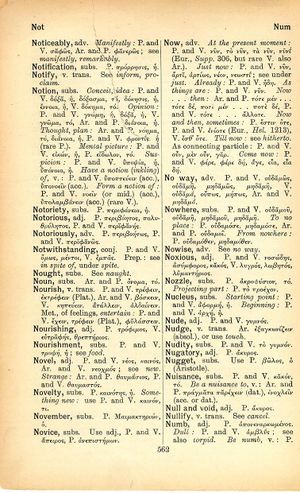nucleus: Difference between revisions
Εὐφήμει, ὦ ἄνθρωπε· ἁσμενέστατα μέντοι αὐτὸ ἀπέφυγον, ὥσπερ λυττῶντά τινα καὶ ἄγριον δεσπότην ἀποδράς → Hush, man, most gladly have I escaped this thing you talk of, as if I had run away from a raging and savage beast of a master
(CSV4) |
(6_11) |
||
| Line 3: | Line 3: | ||
<b class="b2">Starting point</b>: P. and V. [[ἀφορμή]], ἡ. | <b class="b2">Starting point</b>: P. and V. [[ἀφορμή]], ἡ. | ||
<b class="b2">Beginning</b>: P. and V. [[ἀρχή]], ἡ. | <b class="b2">Beginning</b>: P. and V. [[ἀρχή]], ἡ. | ||
}} | |||
{{Lewis | |||
|lshtext=<b>nū̆clĕus</b>: (nŭcŭlĕus), i, m. for nuculeus, from nux,<br /><b>I</b> a [[little]] [[nut]].<br /><b>I</b> Lit.<br /> <b>A</b> A [[nut]]; applied also to fruits resembling a [[nut]]: [[nucleus]] amygdalae, Plin. 15, 13, 12, § 42: avellanae, id. 37, 4, 15, § 56: pinearum nucum, id. 15, 10, 9, § 35; cf. [[pineus]], Cels. 2, 22.—Prov.: e nuce nuculeum qui esse vult, frangit nucem, he [[who]] would [[eat]] the [[kernel]] of a [[nut]] breaks the [[nut]], i. e. he [[who]] desires an [[advantage]] should not [[shun]] the [[labor]] of earning it, Plaut. Curc. 1, 1, 55: nuculeum amisi, retinui pigneri putamina, I [[have]] [[lost]] the [[kernel]] and kept the [[shell]], id. Capt. 3, 4, 122.—<br /> <b>B</b> The [[hard]], uneatable [[kernel]], the [[stone]] of fruits: nuculei olivarum, Plin. 37, 11, 73, § 188: persicorum, id. 23, 7, 67, § 132: cerasorum, id. 23, 7, 72, § 141: [[lignosus]] [[nucleus]], id. 13, 19, 34, § 112: acini, id. 23, 1, 9, § 13.—<br /><b>II</b> Transf.<br /> <b>A</b> The [[kernel]], the [[inner]] [[part]], [[inside]] of a [[thing]]: [[nucleus]] gallae, Plin. 24, 4, 5, § 10: myrrhae, id. 12, 16, 35, § 70: allii, id. 19, 6, 34, § 111: conchae, pearls, id. 9, 35, 55, § 111.—<br /> <b>B</b> The [[kernel]], i. e. the hardest, firmest, [[most]] [[solid]] [[part]] of a [[thing]]: pinguitudinis (terrae), Plin. 17, 6, 4, § 42: ferri, id. 34, 14, 41, § 144; 36, 25, 62, § 187: [[insuper]] ex testā [[nucleus]] inducatur, Vitr. 7, 1. | |||
}} | }} | ||
Revision as of 08:40, 13 August 2017
English > Greek (Woodhouse)
subs.
Starting point: P. and V. ἀφορμή, ἡ. Beginning: P. and V. ἀρχή, ἡ.
Latin > English (Lewis & Short)
nū̆clĕus: (nŭcŭlĕus), i, m. for nuculeus, from nux,
I a little nut.
I Lit.
A A nut; applied also to fruits resembling a nut: nucleus amygdalae, Plin. 15, 13, 12, § 42: avellanae, id. 37, 4, 15, § 56: pinearum nucum, id. 15, 10, 9, § 35; cf. pineus, Cels. 2, 22.—Prov.: e nuce nuculeum qui esse vult, frangit nucem, he who would eat the kernel of a nut breaks the nut, i. e. he who desires an advantage should not shun the labor of earning it, Plaut. Curc. 1, 1, 55: nuculeum amisi, retinui pigneri putamina, I have lost the kernel and kept the shell, id. Capt. 3, 4, 122.—
B The hard, uneatable kernel, the stone of fruits: nuculei olivarum, Plin. 37, 11, 73, § 188: persicorum, id. 23, 7, 67, § 132: cerasorum, id. 23, 7, 72, § 141: lignosus nucleus, id. 13, 19, 34, § 112: acini, id. 23, 1, 9, § 13.—
II Transf.
A The kernel, the inner part, inside of a thing: nucleus gallae, Plin. 24, 4, 5, § 10: myrrhae, id. 12, 16, 35, § 70: allii, id. 19, 6, 34, § 111: conchae, pearls, id. 9, 35, 55, § 111.—
B The kernel, i. e. the hardest, firmest, most solid part of a thing: pinguitudinis (terrae), Plin. 17, 6, 4, § 42: ferri, id. 34, 14, 41, § 144; 36, 25, 62, § 187: insuper ex testā nucleus inducatur, Vitr. 7, 1.

